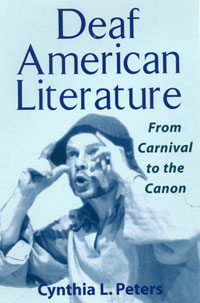From Carnival to the Canon
Cynthia L. Pettie (Peters)
Now in Paperback!
September 2000
| Table of contents Excerpt Review |
$63.50 paperback, ebook |
“The moment when a society must contend with a powerful language other than its own is a decisive point in its evolution. This moment is occurring now in American society.” Cynthia Peters explains precisely how American Sign Language (ASL) literature achieved this moment by tracing its past and predicting its future in Deaf American Literature: From Carnival to the Canon.
Peters connects ASL literature to the literary canon with the archetypal notion of carnival as “the counterculture of the dominated.” Throughout history, carnivals have been opportunities for the “low,” disenfranchised elements of society to displace their “high” counterparts. Citing the Deaf community’s long tradition of “literary nights” and festivals like the Deaf Way, Peters recognizes similar forces at work in the propagation of ASL literature. The agents of this movement, Deaf artists and ASL performers—“Tricksters,” as Peters calls them—jump between the two cultures and languages. Through this process, they create a synthesis of English literary content reinterpreted in sign language, which raises the profile of ASL as a distinct art form in itself.
In this trailblazing study, Peters applies her analysis to the craft’s landmark works, including Douglas Bullard’s novel Islay and Ben Bahan’s video-recorded narrative Bird of a Different Feather. Deaf American Literature, the only work of its kind, is its own seminal moment in the emerging discipline of ASL literary criticism.
Cynthia L. Pettie (Peters) is a professor in the Department of English at Gallaudet University.
Paperback
ISBN 978-1-56368-577-4
6 x 9, 226 pages
$63.50
Ebook
ISBN 978-1-56368-173-8
$63.50
